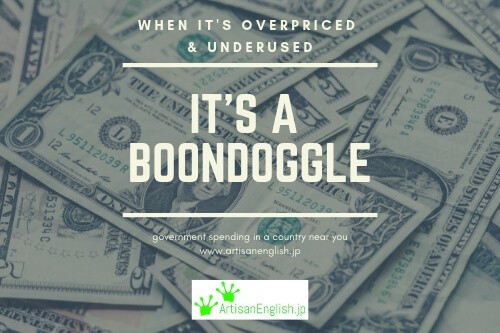
YouTube / iTunes / Spotify / Radio Public / Pocket Casts / Google Podcasts / Breaker / Overcast
Listen to ArtisanEnglish.jp posts & lesson intros here.
WotD: Boondoggle
Boondoggle is a word you’ll often hear used in political debates and newspaper commentary on political decisions.
Before we get into the matter, I should explain that a boondoggle is a large, useless and expensive thing constructed using public money; it’s a white elephant.
No country, political party or politician has a monopoly on wasting public funds.
However, because I live in Japan, I’ll give some possible examples of white elephants here.
You can refer to my white elephant post from August 11, 2018, later or now if you like, but I’ll give a few more examples here.
Japan is building a new national stadium for the 2020 Tokyo Olympics.
When they hold the Olympics, most cities do this, so by itself, this is nothing out of the ordinary.
However, since the original cost of the stadium had been estimated at ¥130,000,000,000 (130 billion) and then ballooned to ¥300,000,000,000, it had to be scaled back.
Believe it or not, the Japanese government finally found something they couldn’t afford.
The stadium quickly turned into a boondoggle.
Originally, Zaha Hadid designed a stadium that was deemed too expensive.
The government then refused to pay for the design.
After that, a new architect was chosen, and the stadium had to be completely redesigned from the ground up.
Of course, three hundred billion is still too expensive, so the stadium will be constructed with no roof.
The Canadian government has had its share of boondoggles, too.
In 2016, the new Phoenix pay system went online.
It was supposed to streamline the payment of federal government employees and reduce accounting costs.
It didn’t work when it was introduced, hasn’t worked since and still doesn’t work now.
Federal employees either get paid late, not enough, too much or don’t get paid at all.
So far, the system has cost the government $1,000,000,000,000 and will cost $500,000,000 a year into the future until it is completely fixed.
As I mentioned earlier, no country, political party or politician has a monopoly on wasting public money.
Flesch-Kincaid Readability Test
This post is understandable by someone with at least a 9th-grade education (age 15).
On the Flesch-Kincaid reading-ease test, this post scores 59.
The easier a passage is to read, the higher the score on a scale of 0 – 100.

